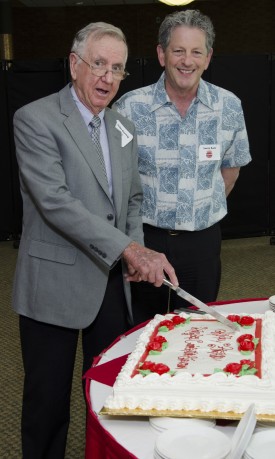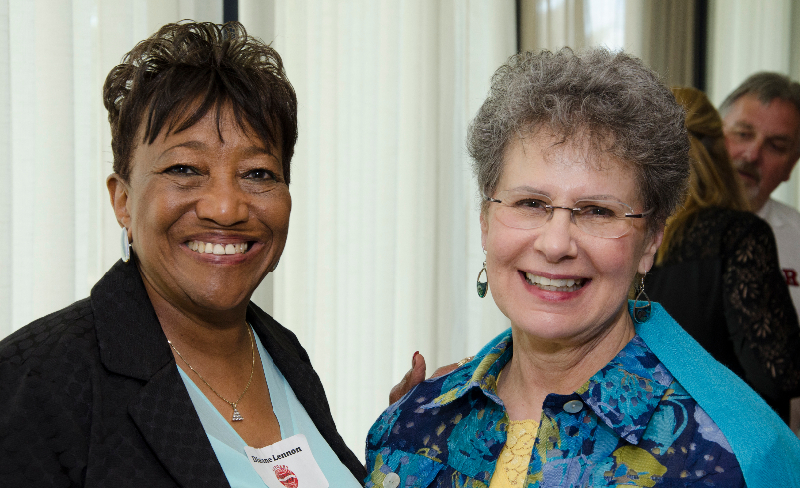
Former and current Rutgers Cooperative Extension directors John Gerwig (left) and Larry Katz cut the cake at the retiree event commemorating the 100th anniversary of Extension.
This year, as Rutgers Cooperative Extension (RCE) celebrates the 100th anniversary of the signing of the Smith-Lever Act of 1914 that created the Cooperative Extension Service, what better way to commemorate its history than to invite back those who were part of its past? To this end, a luncheon for RCE retirees was held at Neilson Dining Hall on the Cook/Douglass campus on June 20. Fifty retirees and their guests attended the event, reuniting with former and current RCE colleagues.
The retirees were former faculty and staff that represented all facets of RCE administration, its extension specialists and the ARMA, FCHS and 4-H departments. Current RCE department heads were on hand to provide updates on institutional activities while Executive Dean Bob Goodman and RCE Director Larry Katz discussed extension’s anniversary and the current state of affairs.
While the retirees appeared to enjoy active and fulfilling retirements, a few never strayed far from Rutgers, continuing work in their respective fields. Retired Extension Specialist in Vegetable Crops Mel Henninger coordinates the educational program for the annual New Jersey Vegetable Meeting (Atlantic Coast Ag Convention and Trade Show) in Atlantic City and is also working with Agricultural Agent Dave Lee on corn and soybean trials at Rutgers Snyder Farm. Recently retired Agricultural Agent Rich Obal (GSNB ’77) teaches courses for the Rutgers Office of Continuing Professional Education and continues his involvement with the Rutgers Master Gardener program.
Many of the retirees in attendance happily shared milestones of their children and grandchildren, and one retiree announced his upcoming marriage. Roger Locandro (Ag ’60, GSNB ’67 and ’73), professor emeritus in the Department of Ecology, Evolution and Natural Resources, is engaged to Bonnie McCay, current Rutgers professor in the Department of Human Ecology.
With so many of the retirees having spent decades in the workforce, it is natural that the topic of how things have changed over the years would come up. This generation of Rutgers Cooperative Extension retirees spans the latter half of Extension’s 100 years and they’ve been witness to the transformative electronic age. Many had entered the workforce in an era when societal norms were drastically different than they are today and opportunities for women were more limited. Retired Business Assistant Mary Gross recalled when she began working at Rutgers in 1953 in the Queens Building that colleagues were not on a first name basis and were referred to as Miss, Mister or Missus. Maureen Mangee, former 4-H program assistant, remembered women having to get permission to wear pant suits in 1964, when women’s office work attire was restricted to dresses or skirts. Gross added that in 1956, her experience was that if a woman was pregnant, she couldn’t work if the pregnancy showed.
But that’s not to say that working women from that era weren’t able to forge their own way. At age 91, former Coordinator of Extension Information Services Bea Devine, who was accompanied by her daughter-in-law Gail Devine, the current business specialist in SEBS Business and Planning Office, recollected how she managed to get her college degrees while working, an opportunity not often available to women at the time. After obtaining a B.S. in management, Devine went on to receive a masters degree in education, making the Dean’s list, all while balancing work and raising a family. Devine was also on the cutting edge of the electronic age, as Cooperative Extension was the first to have computers. Devine recalled teaching youngsters like Mark Robson (CC ’77, GSNB ’79 and ’88), specialist in entomology in the Department of Entomology and dean of Agricultural and Urban Programs, and Bruce Clarke (CC ’77, GSNB ’82), specialist in turfgrass pathology in the Department of Plant Biology and Pathology, how to use a computer.
There was general agreement among the retirees that there was great camaraderie working for Rutgers Cooperative Extension. Esther Neils, retired benefits specialist, expressed that she loved working for Extension. “It was the people that made it,” recalled Neils. Mangee agreed, “It was like family. We went to people’s houses.”
During the luncheon the attendees were brought up-to-date on the current programs in Extension. Dean Goodman proudly acknowledged that Rutgers Cooperative Extension is the most robust extension program in the country.
Rachel Lyons, interim chair of the Department of 4-H Youth Development, noted that 4-H has evolved to keep up with a changing state. According to Lyons, over 50,000 young people participate in 4-H each year, resulting in a $13.5 million volunteer value. In the fall of 2014, 4-H will be rolling out a program that focuses on hunger and 4-H alumni engagement will kick off with a 4-H Homecoming event on August 10 at the Lindley G. Cook 4-H Camp.
Dan Kluchinski (CC ’85), chair of the Department of Agricultural and Resource Management Agents (ARMA), recalled being hired by John Gerwig (GSNB ’56) 26 years ago. Kluchinski said while there are new agents being added to the department, including working on improving water quality in the coastal Atlantic and Ocean counties, there will be focus on future priority programs, as one third of the current agents will be retiring in the next two to three years. Kluchinki summarized the three focus areas of the ARMA department: Growing the Garden State, Horticulture for the Health of It, and Conserving and Sustaining our Natural Resources.
Kathleen Morgan, chair of the Department of Family and Community Health Sciences (FCHS), referenced the department’s traditional practice of conducting programs where people would come to extension offices to participate. Now, said Morgan, FCHS has transitioned over the years to going where people already are, in schools, early childhood centers and worksites, to offer outreach and training about food, nutrition and health.
RCE Director Larry Katz provided an update on the extension specialists, including information on the status of the search for a nursery specialist. He indicated that the last few years have been a challenge for Rutger Cooperative Extension as budget support from the state has decreased by 35 percent. The effective approach to shrinking resources is “by being creative, not shrinking,” Katz said.


